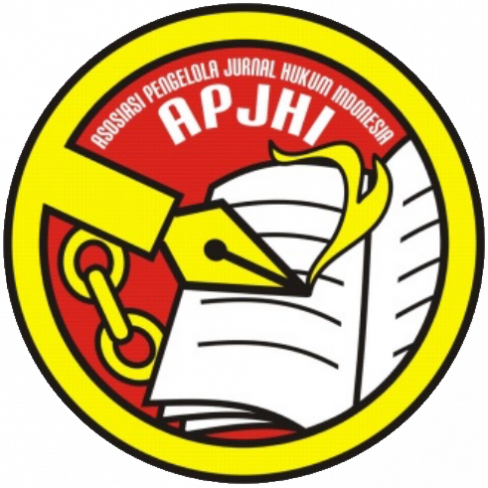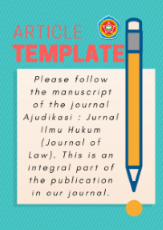Perlindungan Hukum Terhadap Konsumen Pengguna Teknologi Finansial Berbasis Peer to Peer Lending Syariah di Indonesia
DOI:
https://doi.org/10.30656/ajudikasi.v5i1.3267Keywords:
Technology, Financial, Peer to Peer Lending, Syariah, ConsumerAbstract
Today's technological developments are increasingly developing, one of the sectors affected by this technological development is the economic sector. Peer to Peer Lending is a product of technology in the economic sector. Considering that Indonesia is a country with a majority Muslim population, making Peer to Peer Lending experience a change from conventional to sharia. Peer to peer lending sharia must follows sharia principles based on the rules established by the Otoritas Jasa Keuangan and Fatwa Majelis Ulama Indonesia. The convenience provided by Peer to Peer Lending Syariah has the posibility to all the risks that exist, making the government try to be able to protect all parties with existing regulations. This research will be using normative juridical methods, which connected with all the theories, concepts, documents, and regulation which related to peer to peer lending syariah. Therefore, this journal aims to understand positive legal provisions related to the implementation of Peer to Peer Lending sharia and legal protection and legal action that can be taken by consumers based on the regulation of Peer to Peer Lending.
Downloads
References
Buku :
Ash-Shawi dan Muhammad Shalah Muhammad. Problematika Investasi Pada Bank Slam Solusi Ekonomi. Jakarta: Migunani, 2008.
Azzam Abdul dan Aziz Muhammad. Fiqh Muamalat System Transaksi Dalam Islam. Jakarta: AMZAH, 2010.
Johannes Gunawan. “Fungsi Lembaga Pertanggungjawaban Produk Dalam Upaya Perlindungan Konsumen Di Indonesia,†2003.
Peter Mahmud Marzuki. Penelitian Hukum. Jakarta: Kencana Prenada Media Group, 2005.
Sjahdeini, Sutan Remy. Perbankan Syariah Produk-Produk Dan Aspek-Aspek Hukumnya. Jakarta: Kencana Prenamedia Group, 2014.
Soerjono Soekanto dan Sri Mamudji. Penelitian Hukum Normatif: Suatu Tinjauan Singkat. Jakarta: PT Raja Grafindo Persada, 2003.
Jurnal :
Dita Tania dan Sri Bakti Yunari. “Perlindungan Hukum Terhadap Konsumen Financial Technology Yang Berbasis Peer to Peer Lending Di Indonesia.†Jurnal Hukum Adigama 3, no. 1 (2020): 15.
Dodi Yarli. “Analisis Akad Tijarah Pada Transaksi Fintech Syariah Dengan Pendekatan Maqhasid.†Jurnal YUDISI 9, no. 2 (2018): 2.
Fuqoha, Fuqoha, Indrianti Azhar Firdausi, and Arga Eka Sanjaya. “Perlindungan Hukum Terhadap Intervensi Pemberitaan Dalam Kerangka Kemerdekaan Pers Nasional.†Ajudikasi : Jurnal Ilmu Hukum 3, no. 1 (2019): 75. https://doi.org/10.30656/ajudikasi.v3i1.1436.
Hariyani, I. 2019. Perlindungan Hukum dan Penyelesaian Sengketa Bisnis Jasa PM Tekfin. Jurnal Legilasi Indonesia, Vol 14 No 3
Heri Suhendra, Ayon Diniyanto. 2020. Pengawasan Dan Regulasi Terhadap Financial Technology Lending Syariah. El-Iqtishady. Vol 2 No 2
Nurhasanah dan ndra Rahmatullah. 2020. “The Legal Protection of Sharia Financial Technology in Indonesia (Analysis of Regulation, Structure and Law Enforcement)â€, nternational Journal of Advanced Science and Technology. Vol. 29, 3.
Purba, M. Hadyan Yunhas. “Penguatan Perlindungan Konsumen Dalam Industri Peer to Peer Lending Di Indonesia.†Kanun Jurnal Ilmu Hukum 22, no. 3 (2020): 4.
Raden Ani Eko Wahyuni. 2019. Perkembangan Ekonomi Islam Di Indonesia Melalui Penyelenggaraan Fintech Syariah. Mahkamah: Jurnal Kajian Hukum Islam, Vol 4 No 2
Rahmatullah dan Nurhasanah dan Indra. “The Legal Protection of Sharia Financial Technology in Indonesia (Analysis of Regulation, Structure and Law Enforcement).†International Journal of Advanced Science and Technology 29, no. 3 (2020): 3089.
Rokilah, Rokilah. “The Role of the Regulations in Indonesia State System.†Ajudikasi : Jurnal Ilmu Hukum 4, no. 1 (2020): 29–38. https://doi.org/10.30656/ajudikasi.v4i1.2216.
PERATURAN PERUNDANG-UNDANGAN
Kitab Undang-Undang Hukum Perdata
Undang-Undang Nomor 11 Tahun 2008 tentang informasi dan Transaksi Elektronik
POJK Nomor 1/POJK.07/2013 tentang Perlindungan Konsumen Sektor Jasa Keuangan
POJK Nomor 77/POJK.01/2016 tentang Layanan Pinjam Meminjam Uang Berbasis Teknologi informasi
Fatwa DSN-MUI Nomor 117/DSN-MUI/II/2018 tentang Layanan Pembiayaan Berbasis Teknologi informasi Berdasarkan Prinsip Syariah
INTERNET
Dewi Anita, Sistem Penagihan Pinjol Berkah Fintek Syariah Bermasalah, diakses dari https://mediakonsumen.com/2020/12/19/surat-pembaca/sistem-penagihan-pinjol-berkahfintek-syariah-bfs-bermasalah
Sovia Hasanah, Kedudukan fatwa MUI dalam Hukum Nasional, https://www.hukumonline.com/klinik/detail/ulasan/lt5837dfc66ac2d/kedudukan-fatwa-mui-dalam-hukum-Indonesia
Downloads
Published
Issue
Section
License
Authors who publish with this journal agree to the following terms:
Authors retain copyright and grant the journal right of first publication with the work simultaneously licensed under a Creative Commons Attribution License that allows others to share the work with an acknowledgment of the work's authorship and initial publication in this journal.
Authors can enter into separate, additional contractual arrangements for the non-exclusive distribution of the journal's published version of the work (e.g., post it to an institutional repository or publish it in a book) with an acknowledgment of its initial publication in this journal.
Authors are permitted and encouraged to post their work online (e.g., in institutional repositories or on their website) before and during the submission process, as it can lead to productive exchanges and earlier and greater citation of published work.
All articles in Ajudikasi : Jurnal Ilmu Hukum can be disseminated provided they include the identity of the article and the source of the article (Ajudikasi : Jurnal Ilmu Hukum). The publisher is not responsible for the contents of the article. The content of the article is the sole responsibility of the author
Ajudikasi : Jurnal Ilmu Hukum is lincensed under a Creative Commons Attribution-ShareAlike 4.0 International License.










1.png)
.png)
.png)





.png)
.png)
.png)
.png)





.png)







